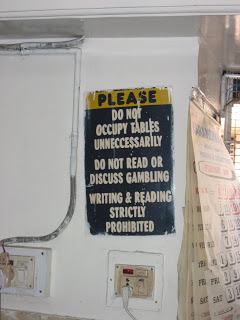Bulgakov's "Adam and Eve" live from the Gare du Nord!
Last Tuesday, the 27th of March, is a date which has a certain significance for me — I won’t say any more than that, because I am a modest lad. Nevertheless, I always try to be somewhere interesting on the 27th of March. One year ago, I was in Venice, for a conference. A year before that, I was in the tunnels beneath the streets of Paris. In my bag I had a saucisson, which I sliced on the lid of a subterranean well, and bottle of wine, which I duly opened. And this year? Well, I decided to go to the theatre with some friends to see a new production of Mikhail Bulgakov’s ‘Adam and Eve’, which is currently playing at Theatre Gérard Philipe in Saint-Denis.
I had read Bulgakov’s excellent The Master and Margarita which is certainly one of my favourite books of all time, and was curious to see what “Adam and Eve” would be like. The propos of the story is interesting enough: Leningrad is destroyed by a chemical gas attack, and only a few people survive. Quite different people, really archetypes — the scientist, the soldier, the writer, the bureaucrat – and Eve.
The opening scene of the play was perhaps the most powerful, most lucid. Our characters are in a Leningrad apartment, and it is only a few minutes before it is clear that one should be very careful what one thinks and does. A totalitarian state. We are introduced to Efrossimov, a scientist, whose inventions are of great interest to Adam and Daragan, two citizens close to the heart of the Party. The actors performances are stylized, exaggerated, and I found myself listening very closely to every word spoken, especially by Professor Efrossimov, the scientist, who certainly gave the aura of having a line on essential truths which evaded the rest of the characters.
But Efrossimov turns out to be wrong about one essential fact: that there would be no war with the enemies of the state. A cloud of gas suddenly descends on the city, and every person who has not been exposed to the rays of Efrossimov’s ‘camera’ dies almost instantly. Footsteps echo across the stage, debris falls from the rafters, a thick cloud descends, and we are in the second scene, a wrecked supermarket, corpses frozen in the aisles in their last act of lifting a pack of biscuits (or whatever). The play moves into its post-apocalyptic phase.
The discussions and conjectures which follow were interesting, but somehow lacked the focus and intensity of the first scene. Everything was beautifully realised, lighting and staging were full of atmosphere and meaning. Certainly the themes were interesting enough: the responsibility of the scientist, the absurd nature of totalitarian dictatorships (which are rendered even more ridiculous when all that is left of the state is (perhaps) five people deep in a forest, four of which want no part of this state at all). So I certainly enjoyed myself, but I felt that the play didn’t quite live up to the promise of the opening scene.
Then it was ten pm, and time to return to Paris – we had travelled to St. Denis, a few RER stops out there in the ‘outer darkness’ beyond the limits of Paris. St. Denis, of course, is where the famous cathedral is, the last resting place of the kings of France, where Abbot Suger invented gothic architecture. Now unfortunately it is better known for being a potentially volatile suburb of Paris. We felt a bit like tourists wandering back to the RER station along the tram lines. But certainly it seemed much more lively than Paris…
Or so we thought. We had to change trains at the Gare du Nord to reach Bastille where one could easily find restaurants open late at night. I was aware that something was amiss at first when I saw piles of earth on the station floors. Piles of earth? I imagined people changed into dirt by a sinister variant of Professor Efrossimov’s camera-rays. Well actually these were broken flower-pots. There were many, many of them. We had arrived from the far end of the station, and as we approached the metro interchange we saw that none of the escalators were working. What? There was a lot of debris scattered around: we were inside the Leningrad supermarket once again.
In one corner, a dense knot of people are pressed against the wall, surrounded by the bright lights of television cameras, dozens of people leaning anxiously forward to see — what? We could hear people chanting, and a violent, unstable atmosphere pervaded the station — as well as more than just a whiff of tear gas. Or something more sinister? A dark cloud descends on the city. To take the metro, we had to pass through a cordon of RATP agents wielding canisters of tear gas, facing crowds of disaffected youths, preventing them from taking trains back to Paris to eat their magrets and drink glasses of wine, as we were most certainly planning to do. Our metro arrived, and in a few minutes we had arrived in the ancient heart of the city, the Marais, more than a little bit relieved. The next day, the news broadcasts revealed what had really happened — or maybe they did.
Technorati Tags: Bulgakov, Gare du Nord, Paris, Theatre
